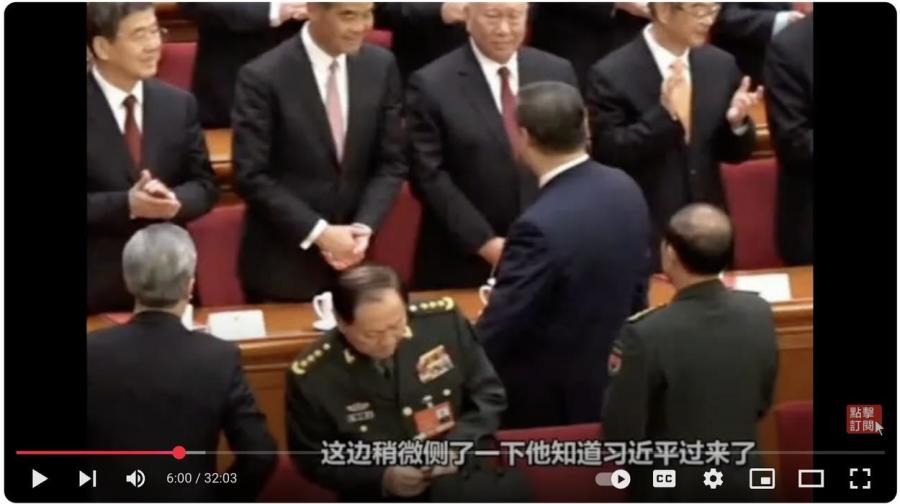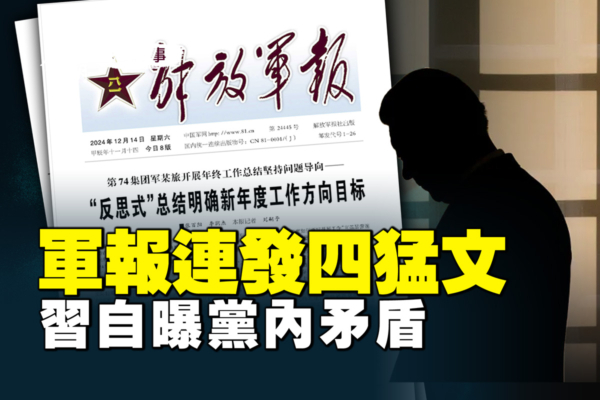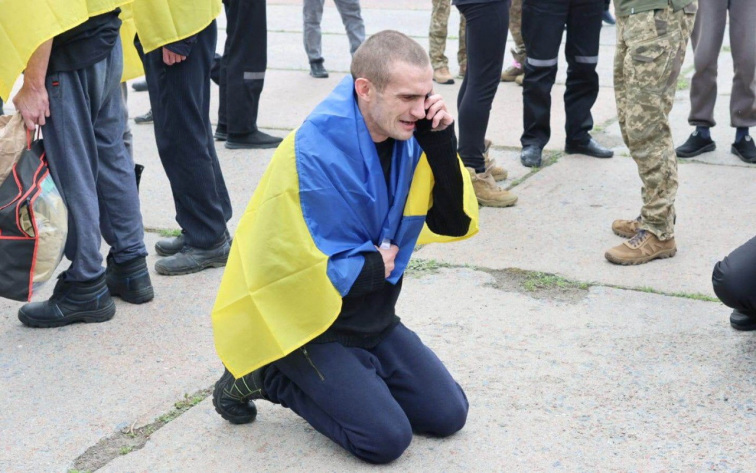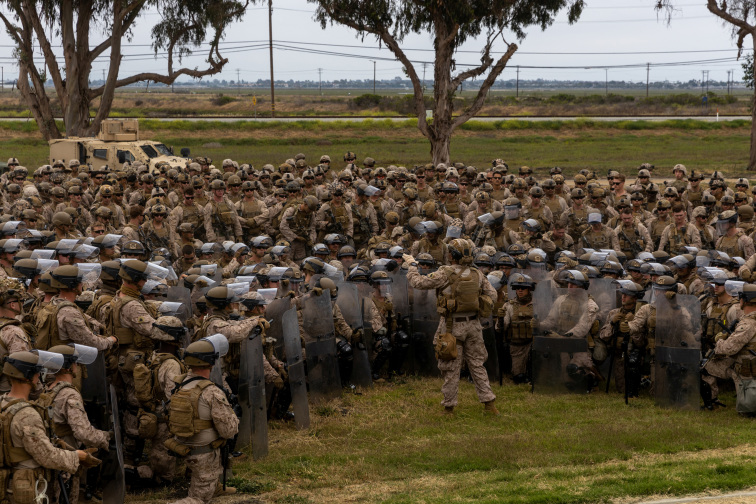During the closing ceremony of the Two Sessions, video footage showed that as Xi Jinping was leaving, several Politburo members, including Vice Chairman of the Central Military Commission (CMC) He Weidong, turned around and stood by their seats to watch Xi depart. However, Zhang Youxia remained facing forward, not even glancing back as Xi walked past behind him. (Screenshot from video)
[People News] Whether Xi Jinping will launch a military invasion of Taiwan by 2027 remains a matter of intense international concern. Recently, a report by the U.S. Air Force's China Aerospace Studies Institute (CASI) indicated that the Chinese military is unable to implement the key reforms necessary to acquire the combat capabilities required to seize Taiwan by 2027. The report cited a published article by Zhang Youxia, Vice Chairman of the Central Military Commission (CMC), from last year, which revealed the military's inability to meet Xi's timeline for an attack on Taiwan. Analysts interpret this as Zhang Youxia openly rejecting Xi Jinping’s Taiwan invasion plan.
The Washington Times reported that the U.S. military's report shows the Chinese military is plagued by internal problems and lagging far behind in reforms, falling significantly short of Xi Jinping's demands for war readiness.
The report noted that in Zhang Youxia’s 2024 article in People’s Daily, he exposed multiple shortcomings within the PLA, including weaknesses in leadership, coordination problems between the military and civilians during wartime, and the inability to carry out large-scale joint operations. Zhang concluded that at the current pace, it would be difficult for the PLA to possess the capability to launch a military attack on Taiwan by 2027.
Despite Xi Jinping’s nine-year anti-corruption campaign and military modernisation efforts, the report emphasised that results remain unsatisfactory. The PLA still suffers from systemic issues such as disorganised command structures, a lack of emphasis on joint operations, slow progress in training and combat readiness, low military governance efficiency, poor resource management, and endemic corruption, especially in integrating new weapons systems.
The report's assessment aligns with that of the U.S. Department of Defence. A senior defence official told the Washington Times: “Even acknowledging that the PLA has made progress, there are still serious gaps in their combat capabilities. If the goal is to be ready to take Taiwan by 2027, they need significantly more time or a major acceleration in preparation. Clearly, they are not there yet.”
Political commentator Zhang Tianliang said on his media program that Zhang Youxia’s statements amount to an open rejection of Xi Jinping’s 2027 invasion strategy.
Zhang argued that the report also explains Xi Jinping’s ongoing purge within the military. Corruption is the core reason for the PLA’s lack of combat effectiveness. The purge is targeting officers resistant to the Taiwan war plan. However, Zhang noted that such purges don't inspire morale and instead damage the military's cohesion, and they fail to solve actual combat-readiness issues. In fact, they may severely impair the command system. “If you look at the real effect, this purge has only shaken Xi’s authority and power base without achieving his intended goals.”
Zhang continued that Zhang Youxia’s stance is a clear sign of disapproval of Xi's overly hasty Taiwan strategy, effectively a direct opposition to Xi’s leadership.
According to U.S. intelligence, Xi has ordered the military to be ready for a Taiwan invasion by 2027 in case it becomes necessary. However, scepticism about the PLA’s real combat capabilities has persisted.
During Chinese New Year, the RAND Corporation released three reports on the PLA, exposing major structural flaws rooted in its primary mission: protecting the Chinese Communist Party rather than preparing for real war. One of the reports, Factors Shaping the Future of China’s Military, noted that although the PLA models itself on the U.S. military to develop joint operations capabilities, the Party’s rigid “gun under Party command” doctrine and extreme centralisation undermine the autonomy necessary for real-time battlefield decisions. The report concluded that political priorities outweigh military goals, with up to 40% of training time spent on political indoctrination.
Another RAND report, Political Legitimacy and the People’s Liberation Army, stated that Xi Jinping’s declining political support has severely impacted the development and performance of the PLA.
In December of last year, the Pentagon’s annual China Military Power Report included, for the first time, a dedicated section on PLA corruption. It revealed that between July and December 2023, at least 15 senior officers and defence industry executives were dismissed, likely disrupting morale and hindering China's military modernisation timeline.
Dajiyuan columnist Wang He has written that corruption is the PLA’s fatal weakness. Despite over a decade of Xi’s anti-corruption crusade, it has failed to contain the problem—in fact, the more he fights corruption, the worse it gets.
Following the CCP’s 20th Party Congress, Xi launched a sweeping military purge that included top officials like CMC members, State Councillors, and Defence Minister Li Shangfu, as well as all three former commanders of the Rocket Force: Wei Fenghe, Zhou Yaning, and Li Yuchao—many of whom were protégés of Zhang Youxia, the CMC’s first vice-chairman.
Columnist Wang Youqun has argued that this purge centers on military equipment corruption. Zhang Youxia previously served as the first minister of the Equipment Development Department after the 2015 military reform and was formerly the head of the General Armaments Department. Many of those purged were his subordinates.
Wang warned that if Zhang didn’t act quickly, he could be Xi’s next target.
During the Third Plenary Session in July 2023, Xi was hospitalised, giving Zhang Youxia an excellent opportunity to strike back. Under Zhang’s leadership, several of Xi’s key military loyalists were either reassigned or purged.
Since last summer, multiple signs have suggested Xi is losing power. His loyalists are being sidelined across various sectors, especially within the military. For instance, CMC Political Work Department Director Miao Hua was abruptly investigated in November, and CMC Vice Chairman He Weidong has been missing since March 2025. He was deeply involved in formulating Taiwan's war plans. Now, Zhang Youxia is believed to be in sole command of the military.
When U.S. National Security Advisor Jake Sullivan visited Beijing in August 2023, he had planned only to meet Wang Yi, but after doing so, he requested meetings with both Zhang Youxia and Xi Jinping. This led to speculation that the U.S. believed real military power resided with Zhang.
From October 24–26, Zhang Youxia visited Vietnam and received high-level receptions from top Vietnamese leaders, further fueling speculation.
Independent commentator Cai Shenkun noted on October 30 that Zhang’s statements during the trip went far beyond his role as a military vice chairman and appeared to position him as a national leader with broader authority.
Wang He compared Zhang Youxia’s current status to that of Deng Xiaoping—though Zhang lacks civilian administrative experience, he is a princeling with deep ties to CCP elders. Wang suggested that Zhang could ally with party elders to restore collective leadership and limit Xi’s powers.
Dajiyuan sources claimed Xi is still nominally in power but has effectively lost control. Figures like Wen Jiabao and Zhang Youxia now play decisive roles in shaping China's political direction. Xi reportedly began losing his grip as early as April 2024. Despite several attempted counterattacks, including armed moves, all failed. Xi is now merely "acting" his role—doing whatever he’s told, even travelling to Russia on command.
2027 marks the 100th anniversary of the PLA’s founding. Some analysts speculate Xi may seek a fourth term at the 21st Party Congress and use a resolution to the Taiwan issue to validate his military reforms, bolster his legitimacy, and justify staying in power, explaining the urgency behind a possible 2027 Taiwan campaign.
On May 31, U.S. Secretary of Defence Pete Hegseth gave a speech at the Shangri-La Dialogue in Singapore, delivering the strongest warning yet on Taiwan. He emphasised that the PLA threat to Taiwan is real and imminent, but also asserted that Beijing would not dare to invade while President Trump is in office.
(First published by People News)










News magazine bootstrap themes!
I like this themes, fast loading and look profesional
Thank you Carlos!
You're welcome!
Please support me with give positive rating!
Yes Sure!